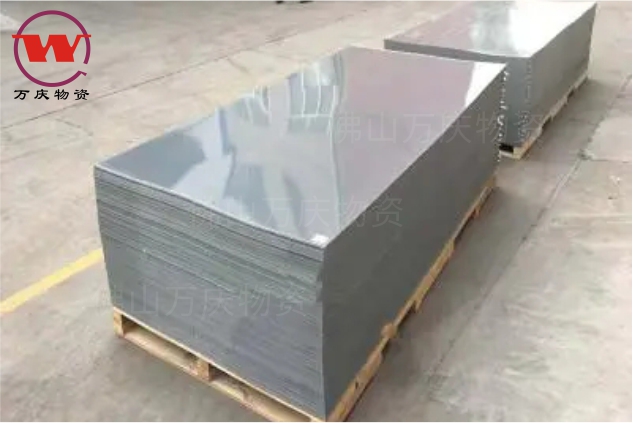“不锈钢”一词不仅仅是单纯指一种不锈钢,而是表示一百多种工业不锈钢,所开发的每种不锈钢都在其特定的应用领域具有良好的性能。成功的关键首先是要弄清用途,然后再确定正确的钢种。和建筑构造应用领域有关的钢种通常只有六种。它们都含有17~22%的铬,较好的钢种还含有镍。添加钼可进一步改善大气腐蚀性,特别是耐含氯化物大气的腐蚀。 The term "stainless steel" not only refers to a kind of stainless steel, but also to more than 100 kinds of industrial stainless steel, each type of the stainless steel developed has good performance in its specific application field. The key to success is first to understand the purpose, and then to determine the right steel type. There are usually only six kinds of steel related to the application field of architectural construction. They all contain 17 to 22% chromium, and the better steel species also contains nickel. The addition of molybdenum can further improve the atmospheric corrosion resistance, especially the corrosion resistance of the chloride-containing atmosphere. 201不锈钢板主要用于做装饰管,工业管,一些浅拉伸的制品.201不锈钢板具有与不稳定的镍铬合金304相似的抵挡一般腐蚀的能力。201不锈钢板在碳化铬程度的温度范围中的长时间加热可能会影响合金321不锈钢板和347在恶劣的腐蚀介质中的。201不锈钢板主要用于高温应用,高温应用要求材料有强的抗敏化性,以防止在较低温度的粒间腐蚀。 201 stainless steel plate is mainly used for decorative pipe, industrial pipe, some shallow stretch products. The 201 stainless steel plate has the ability to withstand general corrosion similar to the unstable nickel-chromium alloy 304. The prolonged heating of 201 stainless steel plates in the temperature range of chromium carbide degree may affect that of alloy 321 stainless steel plates and 347 in harsh corrosive media.201 stainless steel plates are mainly used for high temperature applications that require strong antisensitization resistance to prevent intergranular corrosion at lower temperatures. 201不锈钢的物理性能为20℃时的密度7.93kg/dm3,熔点1398~1453℃,0℃~100℃的比热容为0.50kJ/(kg.K),100℃的热导率为16.3W/(m.K),0℃~100℃的线膨胀系数为15.7×10-6/K,20℃的电阻率为0.69.mm2/m,20℃的纵向弹性模量为197kN/mm2,无磁性。 The physical performance of 201 stainless steel is density of 7.93 k g/dm3 at 20℃, melting point of 1398~1453℃, specific heat capacity of 0℃ ~100℃ is 0.50kJ/(kg.K), thermal conductivity of 100℃ is 16.3W/(m.K), linear expansion coefficient of 0℃ ~100℃ is 15.710-6 / K, resistance of 20℃ is 0.69.mm2/m, longitudinal elastic modulus of 20℃ is 197 kN/mm2, no magnetism. 不锈钢不生锈的主要原因是它含有10.5%以上的铬元素,这个元素的存在让不锈钢在发生氧化反应时,表面形成一层钝化膜,起到隔绝空气的作用,钢或铁接触不到氧气,自然就不会发生反应生锈了。 The main reason why stainless steel does not rust is that it contains more than 10.5% chromium element, the existence of this element makes stainless steel in the oxidation reaction, the surface forms a layer of passivation film, play the role of the air isolation, steel or iron can not contact oxygen, naturally will not react to rust. 不锈钢也不是一直不会生锈的,外部的储存环境因素非常重要,在气候干燥、通风条件好的情况下不会生锈,如果是连续的阴雨天气,或者是空气中的酸碱度偏高就很容易生锈,潮湿阴暗的环境中呆的时间久了也很容易生锈。 Stainless steel is not always will not rust, external storage environment factors are very important, in the dry climate, good ventilation conditions will not rust, if it is continuous rainy weather, or the acidity in the air is easy to rust, wet and dark environment for a long time is also easy to rust. 不锈钢会不会生锈还有一个更重要的因素是看里面的镍(Ni)含量,镍能扩大钝化范围,提高耐蚀性,尤其在非氧化性介质(如稀硫酸)中。 A more important factor in whether stainless steel will rust is to see the nickel (Ni) content inside, which can expand the passivation range and improve corrosion resistance, especially in non-oxidizing media (such as dilute sulfuric acid).
佛山厂家不锈钢

| 






 粤ICP备19012422号
粤ICP备19012422号